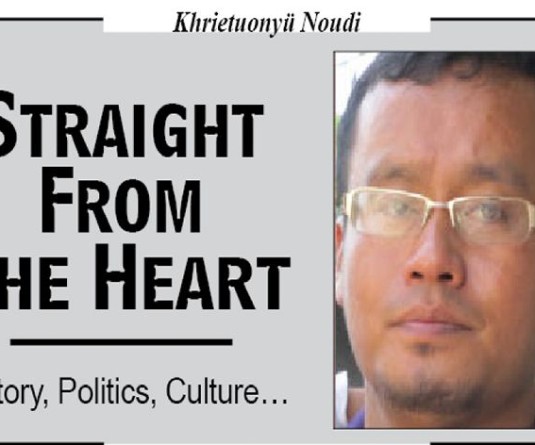
Dr. Salikyu Sangtam
Tetso College
“God is Death. God remains death. And we have killed him.” These were the words of the 19th century German Philosopher, Friedrich Nietzsche. For Nietzsche, the death of God was an indication of the spiritual and moral crisis in the modern society, a crisis in which we have ceased to lead a life centered on God. As he further goes on to remark, “What after all are these churches now if they are not the tombs and sepulchers of God?” In other words, God not only is death, but the churches signify the evidence of His death: the catacomb for what once was.
This observation by Nietzsche is relevant for any society, especially in our highly uncertain society. As society modernizes, religion no longer plays the same prominent role that once permeated the whole of life. Life in modern society cannot and does not center on religion. Rather, it is slowly but surely secularized, eventually, instituting itself as one out of numerous compartments or sections of life in which we are religious one day a week or four days per month. This secularization of religion is evident by the fact that religion has become organized and institutionalized. Hence, we have copious numbers of church councils and associations corrupting the original message of the Christ. The compartmentalizing of life in modern society clearly diminished the importance of religion, where we have days set aside for national holidays, for work days, and for observing religious sacraments. One could certainly see such to be the case even in our society that is only just wheeling out from traditional towards pseudo-modern society: we have days for national and state holidays, working days, and days for religious holidays and rituals. And such segmentations have heavy religious implications, whether we choose to accept it or not.
Readers must understand that religion serves as a source of communal unity. Besides its functions as a guide for ‘moral,’ ‘spiritual,’ and ‘after’ life, religion also functions as a means to attain social cohesion that enables collective identity, i.e. to inhibit divisions. And in our society, conversion to Christianity came with a sense that the cleavages among various tribes can be sundered away and that one united collective identity (‘Naga’) can be attained. No doubt, Christianity has become the common denominator and ‘Nagas’ as, somewhat, its inchoate common identity among the various tribes. However, what were left out of such utopic visions were the consequences brought about in the process of constructing collective identity. Even though tribes adopted Christianity, the conversion failed to address the prevailing tribal identities, which were the products of many generations. That is to say, Christianity failed to negate tribal identities, which were more dearly held (even more than being a Christian) by its members, as their primary identity. Christianity, claiming to be a universal religion in which its members belong to the same community of God, failed to realize that human identities created out of socio-historical circumstances cannot just disappear even in the face of religion. It failed to realize that man is inherently bad and is inherently prone to divisions. Thus, our society today—even though some may vehemently maintain that we are not fragmented by citing shallow examples of festivals, intertribal unions, and so forth—is highly divided: tribalistic.
With Christianity failing to ascertain a sense of oneness with one indivisible identity, the obvious natural successor became nationalism: Naga Nationalism. The rise in Naga nationalism has much to do with a sense of creating a concrete indivisible identity in which religion had tried and failed than to do with the demand for an independent nation. This sentiment is fueled by the need for certainty which religion had hitherto provided. However, this time our society turned to a social-political force, Nationalism, rather than a religious force, Christianity. With that, nationalism became the new god, the religion after the “death of God.” Nevertheless, the problem is that Nagas have, at best, an inchoate identity about themselves. By which I mean, we are still confused about who we are, i.e. which tribes constitute the ‘Naga’ and which do not as well as the unremitting primacy of tribes as the principal source of one’s identity.
It is essential to remind ourselves that nationalism is truly realized when members derive their principal identity from the society as a whole, not their tribes, clans, kinships, etc. In other words, Naga as an identity will only be realized when ‘nagas’ identify themselves first and foremost as Nagas, not their tribes, clans, etc. As long as this is not understood fully with all its subtle nuances, all the talks about Naga Nationalism will perennially remain an abstract idea. Therefore, in my opinion, the best way to understand Naga Nationalism is from this viewpoint, the inherent need for a united society in which people are aware of who they are in relation to each other. This is the perennial need of any human society.
The point I am trying to make here is that the ascent of nationalism in our society is an inevitable process. Christianity had tried, but it failed because it was never meant to be the adhesive for the creation of a concrete identity. Indeed, most societies have to go through stages where religion had to be relinquished since it served as a hurdle to the realization of nationalism. We better not forget that most of the bloodiest wars in human histories have been fought not between religious groups but among its members along sectarian divisions: Christians against Christians, Muslims against Muslims. So, what does this, then, tells us of religion and identity?
Naga Nationalism is and will not be an easy task, nor will it be realizable as is usually assumed. Rather, just as religion had failed in creating a cohesive identity for the society, Naga nationalism will too succumb to the same outcome, even if we do manage to construct a unified identity. Of course, I am by no means saying that Naga nationalism will come to not at the present moment. Rather, Naga nationalism will develop over the next generation or so, and, just like any instrument that has been overused, it will be depleted and drained of its appeal and usefulness. And soon, another ‘label’ (whatever it may be) will become the new ideal, the new religion, the new god towards which the society strives to attain.
Humans are bound to create divisions even where none have hitherto existed; we may even find excuses for creating divisions for economic or political reasons, one only need to look at the world’s revealed religions and their innumerable denominational divisions. Much in the same way, nationalism will perhaps create the same kinds of divisions even among its own members. The point is that issues of identities ought to be the least of things society should worry about. For, in the end, there will always be divisions created over the most nonsensical and preposterous of reasons. Indeed, how can unity be realized when we conform to an ideal or a label we’ve created for our own selfish social, political, and economic gains. This is why, as history has shown, no sense of collective or group identity survives. It shows the intrinsic fallibility of us and our ideals—religion, nationalism, or otherwise.
I wanted to end in an optimistic tone, but that would be disingenuous. Thus, I will conclude by noting that religion has become a joke in which the hypocrisy of Christianity fills peoples’ heart with hatred, and so today our society is a society of indifference. What the ‘self-righteous’ and ‘morally superior’ church councils, members, organizations, and associations preach and proselytize only mocks the inner sincerity of what Christianity once entailed, for such a scenario is possible today because “God” truly “is dead” and “remains death.” And not only the churches, but the deceptive actions of the church, its members, and church councils testify to the death of God. After all, if God wasn’t death, why would churches be insincere in their deeds? To paraphrase Dostoevsky, since there is no God, all is permissible. Thus, we see the insincerity of the churches and the ascent of abstract ideals such as nationalism. For Nagas, nationalism is seen to be divine, a divine calling. It is divine because we need something else to replace the God we’ve killed, for the divine exists no more. Nationalism is the new god; thus, we’ve got tribal churches, church councils and associations vehemently and zealously advocating Naga Nationalism. This is because even the church members, councils, and so forth realize that “God is Death” and so they fanatically cater to worship and sing paeans to their new god: Naga Nationalism. We’ve put in God’s place, with the most enthusiastic help from the church, an abstract ideal that cannot come to pass.





